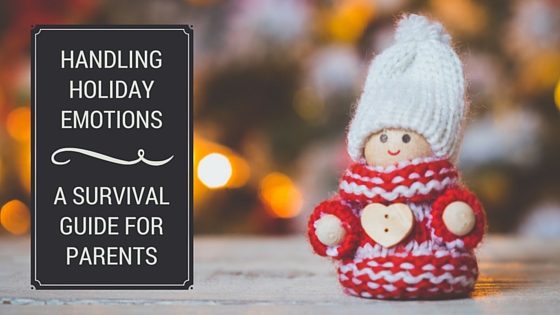Your kids are at home on winter break.
Your in-laws are coming to town or you’re visiting them.
You’ve still got cooking, laundry, and house cleaning to do.
Your child’s emotions are amplified from the norm–he’s so excited he can’t sleep, she’s scared of Santa Claus, he’s disappointed by his gifts, and she’s on a sugar high.
You see “those other moms” who already have their Holiday prep done, who have it all together, and who dress their children in matching sweaters (okay, maybe not the matching sweaters part)….
Or maybe during your visit with extended family, you get into a mental comparison between your kids vs. the cousins, your worldly success vs. theirs. It can be a mental poop-storm on a day that you’re hoping to create love, joy, and peace for your children and everywhere.
It’s easy to feel overwhelmed, jealous, like you’re not enough, and go into “survival mode”.
If I’m speaking your language, you’ll love today’s blog post. I’ve got 4 time-tested, research supported methods to hit your “emotional reset button”….
1. Care for Yourself
This may be the last thing on “your list” with everything else going on, but recharging yourself has a direct impact on your emotional reserves, and consequently, on how you parent.
Research has also discovered that men and women handle stress differently. Women are more likely, when stressed, to abandon the exact things that help them get unstressed. We care for ourselves the least (and the last) at the times we need it the most.
So how do you care for yourself when things are really busy–tea, yoga, meditation, exercise, hot shower, journal, social time?
I do 2 things to make it happen:
- I schedule my recharge activity (and I usually do it before my family is awake really early in the morning–this might not work for everyone) AND
- I do it with a friend
This week, I’ve got two walks planned with different girl friends at the beach (this is a 3 for 1–being outside, exercising, and getting “girl time”).
2. Say “Yes” to Healthy Foods
I love chocolate and treats. My consumption of treats increases especially when I’m stressed or if it’s a “special occasion” or if I’m traveling and not around the foods I usually eat. For me the holidays are particularly challenging food-wise, because they’re often all of the above–stressful, special occasions involving travel! Arg!
After a rich, sugary treat or a carb-heavy meal, my mood and energy are lower, and my body just feels…. gross.
So I do a little “trick” when I’m choosing what to eat. I ask myself “Is this what I will be happy that I ate an hour from now or a day from now?” Tuning in to my “future self” to make choices in the present moment is not just really effective, it’s also a trick discovered by researchers to help people make better choices.
3. Stay Centered
Reading the work of Tara Mohr (Playing Big) I discovered that I had an “inner critic”. This “voice inside my head” doesn’t have anything nice or supportive to say about me, or others. The critic is the voice of fear, anger, frustration, “not enoughness”, and judgement. My inner critic speaks very loudly, but especially when I’m comparing myself to others.
It’s embarrassing to admit to you that being around extended family during the Holidays provide, unfortunately, more opportunities to compare myself, my life choices, our children, our lifestyle, and values. It’s never pretty. No one wins.
Instead of listening to the voice of my “inner critic” (who can even sound like the voices of family members) Mohr urges her readers to ask, “How can I embody love in this situation?” or “How would love respond here?” and to follow the wise advice of the inner mentor, rather than the inner critic. (As an aside, Tara’s book is one of the best I’ve read. If it’s not on your reading list, get it on there.)
4. Choose and Surrender
It is often my expectations of myself that cause me the most pain. When people aren’t living up to my standards (my children aren’t as polite as I want), when situations aren’t as wonderful as I wanted (the house isn’t as clean as I’d hoped) and when I don’t live up to my own high standards, I feel sadness. My sadness isn’t because of the situation, it’s because of my expectations of the situation aren’t meeting up with the reality.
So if I change the my thoughts about the situation, I can reinterpret what is occurring. This is not lying to myself–I’m still being accurate about what is happening–I’m just changing how I relate to it. I’m separating the “what is happening” from “my story about what is happening”.
There is nothing either good or bad but thinking makes it so. – William Shakespeare
And I can get a lot of freedom to by choosing how to relate to something, by seeing things as they are rather than how I want them to be, by lowering my expectations that are causing my pain and by choosing which story I want to tell myself.
You might call “lowering expectations” to be surrendering. To some, surrendering sounds passive and weak. But surrendering is actually quite powerful.
Surrendering is about loving what is, choosing what is, and being loving to myself and to others.
Love to you, blessings to your family and peace on earth!
From Both of Us,
Cecilia and Jason Hilkey

